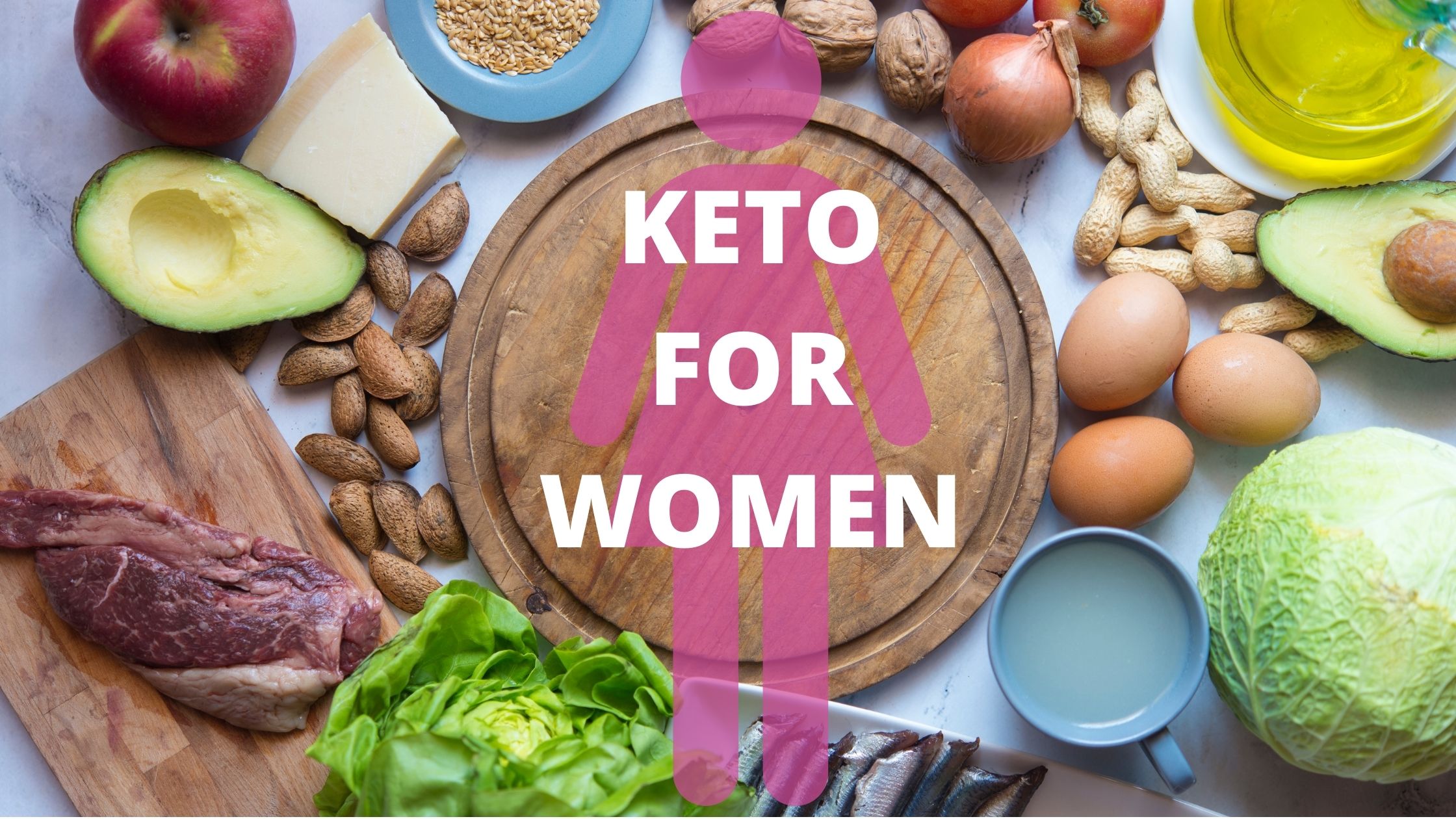We often hear of the great benefits of becoming fat-adapted using a ketogenic diet. Whether it’s weight loss, mental clarity, increased energy, food freedom, whatever it may be, there is a lot to gain by following a ketogenic diet or at the very least experimenting with one for some time. There seems to be something uniquely liberating and beneficial to supporting our body’s metabolic flexibility by relying on fats and ketones to fuel our days.
But are these benefits skewed towards males? Do women experience the same success rate?
Here’s the thing. Not all women will respond the same to a ketogenic diet, just like not all people will respond the same to a ketogenic diet. Keep in mind that the ketogenic diet is a metabolic therapy, it works like medicine in the treatment of a variety of disorders and its therapeutic potential doesn’t seem to be impacted by biological sex. So, if you are a female suffering from a condition that has been shown to improve with nutritional ketosis, then it is absolutely worth considering. Besides the metabolic disorders that we discuss below, these include conditions such as epilepsy, GLUT1 deficiency syndrome, Alzheimer’s disease, certain cancers, brain injury, among others.
Aside: It is well-known that dementia is associated with insulin resistance and reduced brain glucose metabolism, and a recent study provides further evidence to support the metabolic underpinnings of cognitive decline. This study found that the greater the degree of insulin resistance, the smaller the hippocampal volume (region of the brain involved in memory and learning). Interestingly, the association was stronger in women.
Ultimately, context is so important to take into consideration when evaluating your unique situation.
Let’s start with where the ketogenic diet can shine for the female population.
There are a number of metabolic disorders that respond favorably to lowering blood sugar and insulin levels and increasing fat and ketone metabolism. Type-2 diabetes, obesity, metabolic syndrome, and PCOS fall within this category. Virtually any condition associated with insulin resistance could benefit from a carb-reduced diet and/or nutritional ketosis. The females that are most likely to respond well to a ketogenic diet are those with these types of conditions.
Particularly, PCOS or Polycystic Ovarian Syndrome.
Not all women with PCOS are overweight with insulin resistance and concomitant hyperinsulinemia (high insulin levels), but it is very common. Hyperinsulinemia and increased levels of insulin-like growth factor-1 (IGF-1) trigger the production of androgens from both the ovaries and the adrenals causing hyperandrogenism and ovulatory dysfunction. Failing to correct high blood sugar and insulin can exacerbate insulin resistance and risk driving the disease further. Emerging research gives a strong reason to believe a ketogenic diet should be the first line of care for women with PCOS. In 2012, a paper was published entitled “All women with PCOS should be treated for insulin resistance” which is where the ketogenic diet as a therapy becomes interesting. The ketogenic diet works by lowering insulin levels, targeting the blood sugar and insulin derangements seen in PCOS patients, ultimately helping to restore insulin sensitivity. And, more recent research is even showing that ketones themselves may help to normalize insulin resistance. There are a handful of studies where the ketogenic diet is applied in women with PCOS, all of which report hormonal improvements and restoration of the menstrual cycle. These include the 2005 paper by Mavropoulos et al. showing 6-months on a ketogenic diet led to weight loss, reduced free testosterone, improvements in LH/FSH ratio, and reductions in fasting insulin. Two women actually became pregnant during the study despite previously dealing with infertility problems. Two more studies, one published in 2020 another in 2021 also showed that women with PCOS who followed a ketogenic diet for 12-weeks experienced weight loss, improved blood sugar levels, androgen levels, and menstrual cycles.
Why does the ketogenic diet receive pushback for women?
Unfortunately, we don’t have a lot of data to turn to in healthy adult populations and instead anecdotal reports find their way into popular blogs causing women to fear low-carb diets. Their reasonings are often what they believe “makes sense,” but just because something “makes sense” doesn’t mean it’s true if it’s never been tested, as I’ve heard Layne Norton say before.
That said, there are some reports that may make women hesitant to adopt a ketogenic diet. In a study in adolescent epilepsy patients following ketogenic diets between the ages of 12 and 19, of the twenty girls, nine (45%) of them reported menstrual problems while on the diet. Specifically, six experienced amenorrhea (loss of a cycle), and puberty was delayed in the other three. Interestingly, four of the nine girls with menstrual irregularities reported weight loss, suggesting something about the diet itself. Similar findings were reported in a study of adult epilepsy patients where all of the nine female subjects reported changes in their menstrual cycle (missed periods or altered cycles) while following a ketogenic diet. Only five of these women lost weight. However, the type of ketogenic diet used to treat epilepsy is extremely strict, with nearly 90% of your calories coming from fat and virtually no carbs. This is not the same ketogenic diet that many healthy women are following.
There are a lot of ways we could theorize why a ketogenic diet might interfere with a woman’s reproductive hormones. For example, states of ketosis could represent an environment of low food availability, which would threaten our ability to support another life. In this case, elevated ketones may be a signal that it’s not a great time to get pregnant, and in response, reproduction shuts down until the body felt “safe” again. However, this theory doesn’t exactly hold as many women achieve great success with a ketogenic diet and we are not aware of any hormonal side effects of exogenous ketones. Many women, albeit often overweight, actually use the ketogenic diet to improve their hormones and fertility.
When women experience hormonal side effects of a ketogenic diet it is likely that they are also engaging in at least one if not all of the following: excess exercise, caloric restriction (consciously or not), and/or rapid weight loss. The types of women that are more likely to experience these types of consequences are lean, athletic women. There are some reports of female athletes experiencing thyroid issues on a ketogenic diet, but is it the ketogenic diet or is it the ketogenic diet with low-calorie intake and exercise in the background? When the body is in an energy deficit, there is the risk of suppressing thyroid activity by reducing the conversion of T4 to T3 (active thyroid hormone). This is a known response to starvation, as a way for the body to conserve energy. The enzyme responsible for this conversion is to some extent regulated by the hormone insulin, and if you recall the ketogenic diet lowers insulin. That said, recreationally active females looking to improve body composition without sacrificing performance or lean body mass may still want to consider a ketogenic diet. These side effects are not inevitable. Depending on the sport, competitive female athletes may also consider a low-carb approach, but this will involve personalization and be more tactical. Working with a sports nutritionist/dietician savvy with ketogenic diets is recommended.
There is a case to be made for periodically increasing insulin levels in healthy women following a ketogenic diet as a lifestyle to prevent/reverse any hormonal side effects associated with chronic carbohydrate restriction. This can be as easy as upping protein intake or eating some starchy vegetables every once in a while. For those with healthy, normal metabolisms, this may also support the body’s overall metabolic flexibility – the ability to use all metabolic fuels as efficiently as possible – by refreshing the metabolic pathways that utilize glucose.
Your baseline body fat percentage is also something to consider. Whether your intentions are to lose weight or not, due to its appetite-suppressing and satiety effects, the ketogenic diet can lead to a spontaneous reduction in calories. If you are already lean, at a certain point (this point looks different for all women but is generally below 18-20%), additional fat loss can threaten reproduction in a similar scenario to that described above as a signal of food scarcity. Symptoms here include irregular menstrual cycles or loss of your cycle altogether (amenorrhea). Again, is it the ketogenic diet or the weight loss? It’s really hard to tease out what is directly contributing to these effects. While mice are not humans, one study showed that female mice continued to cycle normally on a ketogenic diet, but they lost their cycles with caloric restriction.
For already healthy females just looking for a diet that allows them to feel and look their best while simultaneously optimizing metabolic and long-term health, you may not have to go strict keto to get a lot of these benefits. A lot of improvements can be achieved by simply reducing/eliminating refined carbohydrates, sugar, and ultra-processed foods while focusing on a whole-foods based diet. Again, it’s important to consider context and your baseline metabolic health status. This will dictate how much to pull the carbohydrate lever, and in some cases, the ketogenic diet can become a periodic tool for women and men alike within the context of a high-quality non-ketogenic diet.
What about postmenopause?
When women enter menopause, their metabolism also undergoes renovations that predispose them to weight gain and metabolic-related disorders if lifestyle changes are not made. This may partly explain why obesity and metabolic syndrome are three times greater in postmenopausal women than in premenopausal women. At this time in a woman’s life, it appears increasingly important to make changes that support metabolic health, including eating in a way that supports both healthy body weight and insulin sensitivity, of which a ketogenic diet is a great candidate. Post-menopause, it is also very important that women support strength and muscle mass. Although a ketogenic diet is muscle-sparing by nature, it is important to ensure adequate protein intake as we age and engage in some form of resistance training, which is probably the most important variable.
The only major category of women we have not addressed is the ketogenic diet in pregnancy and breastfeeding.
When it comes to diet in pregnancy, especially one viewed as “radical” as a ketogenic diet, it is difficult to conduct the research we’d ideally want to be generating any answers or suggestions from. There are several anecdotal reports of women following a ketogenic diet during pregnancy, but we don’t have any solid research validating its safety. For this reason, we don’t recommend for or against, instead we advise you to work with your practitioner. There are some days during a woman’s first trimester of pregnancy where even the thought of eating is nauseating. This isn’t scientific evidence that automatically makes ketosis safe but does make us raise our eyebrows at anyone claiming that ketosis is inherently dangerous. It is also normal to detect blood ketones during a woman’s third trimester.
What we will say is that the recommendations around carbohydrate intake during pregnancy are very liberal and conservative in the direction of more. However, during pregnancy, the placenta releases hormones that decrease insulin sensitivity, likely as a way to shunt energy to the fetus, and fasting insulin levels rise throughout pregnancy. Pregnant women are at risk of developing gestational diabetes which suggests carbohydrates are something we wouldn’t want to be overconsuming during pregnancy. Interestingly, while glucose can cross the placenta, insulin does not. If the baby is receiving large amounts of glucose, the burden is placed on the baby to produce enough insulin to handle incoming glucose. There is something called the Pedersen Hypothesis that posits hyperglycemia delivered to the fetus through the placenta triggers fetal hyperinsulinemia, causing the fetus to store excess glucose as fat, where babies are born larger than normal. In 2008, results from the “Hyperglycemia and Adverse Pregnancy Outcomes” or HAPO study were published showing a strong association between worse glucose tolerance adverse birth outcomes, including high birth weight, neonatal hyperglycemia, pre-term birth, among others. Perhaps most alarming is that the women in this study were below the threshold of overt diabetes, and therefore “passed” their glucose tolerance test. Metabolic health and glucose control are absolutely things we want to be conscious of during pregnancy, which has obvious implications for carbohydrate quality and quantity. So, while adequate energy intake is important, diet quality and carbohydrate intake still matter. Also, post-partum, mothers are at an increased risk of developing insulin resistance and metabolic syndrome later in life.
While breastfeeding, women require an estimated additional 500 calories per day while breastfeeding to support healthy milk production. Depending on your current body composition, you may get away with more or less, but the point is reducing calories during this time can lead to reduced milk production. As we’ve previously mentioned, a well-formulated ketogenic diet can be very satiating and you may find yourself unintentionally eating less which can be a problem while breastfeeding. Anecdotally, mothers have reported low milk production while following low-carb diets, but there are also those successfully breastfeeding while on a ketogenic diet. There are rare reports in the literature of ketogenic diets causing lactation ketoacidosis which may be due to the high metabolic demands of milk production. It’s suggested that the demands of lactation exceed that of which can be provided by carbohydrate consumption, glycogen stores, and gluconeogenesis while following a ketogenic diet. Because of this, a strict ketogenic diet during breastfeeding is not recommended. The sugars in breast milk have to come from somewhere, and a low(er) carb rather than a strict ketogenic diet may be more appropriate. Careful consideration should be given to nutrient and caloric intake as well as hydration during breastfeeding. If you do choose to follow a low-carb diet, be willing to make changes should you notice it is affecting milk production. Altogether, we aren’t recommending a ketogenic diet to pregnant and breastfeeding women, but there is a case to be made for diets lower in carbohydrates for the health of both mom and baby.
Written by: Kristi Storoschuk; Reviewed by: Dr. Dominic D`Agostino



